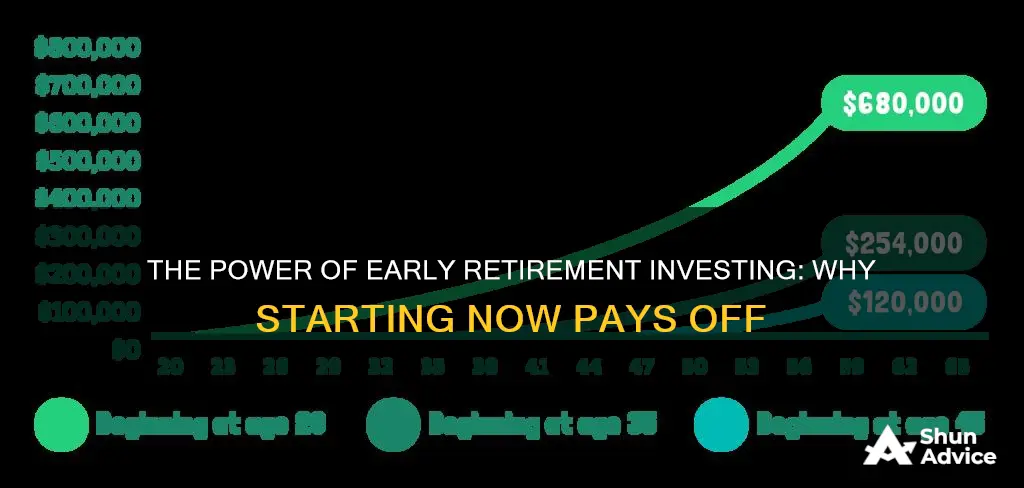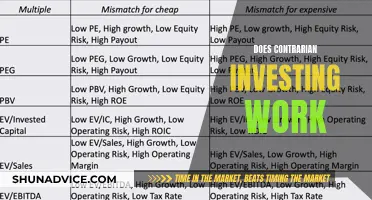
Investing early for retirement is a crucial step towards securing your financial future. While it can seem daunting, starting early means you can build a large enough nest egg to pay for your retirement. The basic idea is that you put money from your paycheck into a tax-advantaged retirement savings account, allowing your savings to grow with compound interest. The earlier you start, the more you can earn.
| Characteristics | Values |
|---|---|
| Financial stress | Less financial stress throughout life |
| Investment amount | Less money spent overall |
| Investment strategy | More creative and strategic investment selection |
| Time | More time to reach retirement goal |
| Interest | Compound interest works in your favour |
| Financial flexibility | Easier to manage day-to-day expenses |
| Risk | Access to higher-risk, higher-reward investments |
| Market fluctuations | Increased probability of investments weathering market fluctuations |
| Social Security benefits | Social Security is uncertain in the long term |
| Inflation | Retirement savings are more likely to keep pace with inflation |
| Life expectancy | Longer life expectancy means more money needed for retirement |
What You'll Learn

Compound interest
Investing for retirement can seem daunting, but it's a crucial step towards securing your financial future. The earlier you start, the more you can take advantage of compound interest, which will help you build a larger retirement fund.
For example, let's say you invest $1,000 in a long-term bond with a 3% interest rate. At the end of the first year, your investment will have grown by $30, resulting in a total of $1,030. In the second year, you will earn interest on this new amount, so your investment will grow by $30.90. While this may not seem like much at first, the effects of compound interest will become more significant over time. By the 39th year, your initial investment will have grown to around $3,167, and by the 40th year, it will be worth $3,262.04—a difference of $95 in just one year.
The magic of compound interest lies in its ability to accelerate your wealth accumulation. The longer your money remains invested, the more compounding periods it experiences, and the larger your investment grows. This is why starting early is crucial. The earlier you begin investing for retirement, the more time your money has to benefit from compound interest.
For instance, if you start investing $100 a month at a positive return of 1% per month or 12% per year, compounded monthly over 40 years, your final amount will be over $1.17 million. On the other hand, if you were to start 30 years later and invest $1,000 a month for 10 years at the same rate, you would end up with only $230,000. Despite investing much more money, your friend's portfolio would be significantly smaller due to the power of compound interest.
The Great Debate: Invest in Your House or Pay Off Debt?
You may want to see also

Financial flexibility
Investing early for retirement can be a daunting task, but it's a crucial step towards achieving financial flexibility. Here are some reasons why starting early is beneficial:
Compound Interest
Compound interest is often touted as the primary reason to start investing early for retirement. The basic idea is that you contribute a portion of your income to a retirement savings account, allowing your savings to grow through compound interest. The earlier you start, the more time your money has to grow. For example, investing $6,000 at a 10.5% return at 25 will grow to over $240,000 by the time you're 62. Waiting until you're 35 to invest the same amount would require a principal amount of $16,250 to reach the same total.
Lower Contribution Amounts
When you start investing early, you can invest in smaller increments to achieve your retirement goals. This means you can contribute a smaller portion of your income each month, making it more manageable to balance retirement savings with other financial commitments.
Diversification and Risk Mitigation
Starting early gives you the advantage of time, allowing you to be more strategic and creative with your investment choices. You can explore different types of investments and diversify your portfolio to mitigate risk and enhance growth potential. Early investing also enables you to take calculated risks with your investment strategy. When you're younger, you have more time to recover from any potential losses and make up for any unsuccessful investments.
Reduced Financial Stress
By investing early, you can spend less of your money overall. Compound interest works in your favor, and you benefit from the power of long-term growth. This means you won't have to invest as aggressively later on, reducing financial stress throughout your life.
Planning Flexibility
The earlier you start, the more flexible your retirement planning can be. You'll have the freedom to adjust your investment strategy as your goals and circumstances change over time. Whether you want to retire earlier or later, travel the world, or adopt a more modest lifestyle, starting early gives you the advantage of adaptability.
Monthly Dividend Payers: Smart Investment or Trap?
You may want to see also

Access to higher-risk investments
Investing early for retirement gives you access to higher-risk investments that can pay off in the long term. The earlier you start, the more time you have to ride out any market volatility and benefit from compound interest.
When you're in your 20s, retirement can seem like a distant prospect, but the benefit of investing early is that you can take more risks with your investment strategy. Higher-risk investments, such as stocks, tend to offer higher returns. If you invest a large chunk of money in these opportunities before your 30s, you still have 10-20 years to make up for any losses if they don't pay off.
The longer you wait to start investing for retirement, the more restricted you'll be in terms of investment options. Later in life, you'll have less flexibility to invest in higher-risk opportunities, as you'll have less time to recover any losses before you retire.
Starting early means you can invest smaller amounts of money and still reach your retirement savings goal. For example, investing $6,000 at 25 years old will grow to over $240,000 by 62, assuming a 10.5% return based on market average over 30 years. To reach the same total with a one-time initial investment at 35 years old, you would need to invest over 2.7 times as much – $16,250.
The power of compound interest means that the longer you leave your investments, the more they will grow. This gives you the opportunity to benefit from higher-risk investments, as you have more time to recover from any downturns in the market.
Starting to invest for retirement early on gives you the flexibility to take risks with your investment strategy, which can pay off in the long term.
China UnionPay: Navigating Investment Opportunities in China's Payment Landscape
You may want to see also

Protect against inflation
Inflation can eat away at the purchasing power of your money over time, so it's important to consider its long-term effects on your financial well-being during retirement. Inflation affects your retirement income by increasing the future costs of goods and services, thereby reducing the future purchasing power of your income. Even a relatively low inflation rate can have a significant impact on a retiree's purchasing power.
- Consider cost-of-living increases: Social Security, certain pensions, and annuities help keep up with inflation through annual cost-of-living adjustments or market-related performance.
- Choose investments that can help keep pace with inflation: Consider growth-oriented investments such as stocks or stock mutual funds, Treasury inflation-protected securities (TIPS), real estate securities, and commodities. These investments may help keep up with or exceed the rate of inflation.
- Diversify your portfolio: Build a diversified mix of stocks, bonds, and short-term investments according to your comfort level with market volatility, your financial situation, and investment horizon. Diversification may provide you with the potential for growth while managing risk.
- Position your investments for growth: Avoid being too conservative or too aggressive with your investments. An investment strategy that seeks to balance growth potential and risk may be ideal. Determine and maintain an asset mix that reflects your investment horizon, risk tolerance, and financial situation.
- Delay major expenses: If possible, postpone major expenses such as extended vacations, luxury purchases, or home remodelling projects. This can help you avoid dipping into your retirement savings or investment income.
- Downsize your home: Consider moving to a smaller home or a more affordable location to reduce expenses. This can include relocating to a less expensive area or downsizing to a condo or retirement community.
- Reduce variable expenses: Look for ways to cut back on discretionary spending, such as eating out, entertainment, or non-essential purchases. This can help you stretch your retirement income further.
- Take advantage of senior discounts: Many businesses offer discounts of 10% or more for seniors. Utilize these discounts whenever possible to save money on various purchases and services.
- Increase your income: Consider part-time work or starting a side hustle based on your skills or hobbies. This can provide additional income to offset the effects of inflation.
- Review your budget and expenses: Analyze your fixed and variable costs to identify areas where you can reduce spending. Create a budget that aligns with your retirement income and makes room for unexpected expenses.
Market Volatility: Should You Invest Now?
You may want to see also

Plan for a longer life expectancy
Life expectancy is one of the most significant factors in retirement planning. Understanding how long you could live is key to ensuring you have enough money to fund your retirement. While no one can predict the future, there are tools available to help you make an educated guess about your life expectancy. This knowledge will help you avoid running out of money in retirement.
How to Calculate Your Life Expectancy
Actuarial life tables can be used to estimate life expectancy. These tables use statistical data to estimate mortality and provide a good starting point for planning. Online life expectancy calculators, such as the Social Security Life Expectancy Calculator and the Actuaries Longevity Illustrator, can also help you make a more personalised estimate. These calculators take into account factors such as your age, gender, health status, and lifestyle choices.
The Impact of Longevity on Retirement Planning
The longer you live, the more money you will need to fund your retirement. For example, if you need $24,000 per year to supplement your Social Security income, you would need an additional $24,000 for every extra year you live. Therefore, it is crucial to plan for a longer life rather than a shorter one. It is better to have money left when you die than to run out of money and need to make drastic lifestyle changes during your final years.
Managing Longevity Risk
A key part of retirement planning is managing longevity risk, which is the risk of outliving your money. This can involve more than just putting extra cash into a retirement account. It may be beneficial to seek out sources of lifetime income, such as Social Security or annuities, which provide a steady stream of cash regardless of how long you live.
Flexible Work and Retirement
The traditional retirement model, where individuals work full-time until a certain age and then transition into retirement, may not be sustainable for individuals who live longer. Instead, individuals may benefit from a more flexible approach to work and retirement, such as working part-time or taking breaks throughout their career. This approach can provide a source of income during retirement and help combat the psychological effects of retirement, such as cognitive decline.
Smart Ways to Invest $2000
You may want to see also







